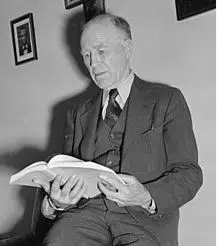
FARGO (KFGO) – When North Dakota Governor Doug Burgum announces his run for the Republican Party’s nomination for President next week, history will be made in a number of ways. But it will be difficult to claim he’s the first North Dakotan ever to run for the nation’s highest office.
Some might consider Teddy Roosevelt, who famously attributed the time he spent in the state to becoming President, but he wasn’t from North Dakota originally and only spent a few years here in total.
There is another man, however, who is not as well known but better fits the bill. William Lemke was a prominent character in North Dakota politics for over 30 years, starting around 1915 as a leader in the farm protest movement that famously led to the establishment of the Nonpartisan League (NPL). Lemke went on to serve as one of the state’s at-large members of the U.S. House of Representatives for eight terms.
Prairie Rebel is the title of a book about Lemke’s public life by the late historian Edward Blackorby, who described Lemke as “one of the most distinctive figures in North Dakota, and the state would not always be so fortunate in having devoted and able leadership such as he provided.” Blackorby attributed the creation of such institutions as the Bank of North Dakota and state mill in large part to Lemke’s efforts.
Lemke wasn’t born in North Dakota, but North Dakota didn’t yet exist when he was born. He was born in Minnesota’s Stearns County in 1878. When he was 2 years old, his parents moved to Grand Forks and bought a hotel. A couple of years later they relocated to Towner County in what was then Dakota Territory. North Dakota became a state in 1889.
Lemke went to Yale for law school and came back to Fargo and set up his practice in 1905. He was elected to be North Dakota’s Attorney General in 1920, but he was recalled along with the rest of the state’s Industrial Commission (including then-Governor Lynn Frazier) by anti-NPL groups in 1922.
He was first elected to Congress in 1932 and was known for championing the causes of family farmers during the Great Depression.
In 1936, Lemke was recruited by various fringe political factions to run for President on the newly-created Union Party ticket against Franklin Roosevelt. Lemke was unhappy with Roosevelt’s unwillingness to adopt a farm mortgage refinancing program he’d proposed. The splinter groups and individuals who enlisted Lemke to run were political populists, the most famous of whom was Father Charles Coughlin, a radio personality known for his fierce opposition to Roosevelt and the New Deal and, later, his virulent antisemitism.
Lemke’s run for President was unremarkable. He garnered less than 2% nationwide, and only 13.4% in his home state of North Dakota. The Union Party went defunct the following year.
He continued to serve the state in Congress until 1940 as a member of the NPL. He ran again for the seat in 1942 as a Republican and served until his death in 1950.
When Burgum makes his announcement next week he will be the first North Dakota-born person to launch a serious bid for President and the first North Dakotan ever to seek nomination by a major party. But calling Burgum the first North Dakotan to ever run for the nation’s highest office would be a stretch, given William Lemke’s 1936 bid.




Comments